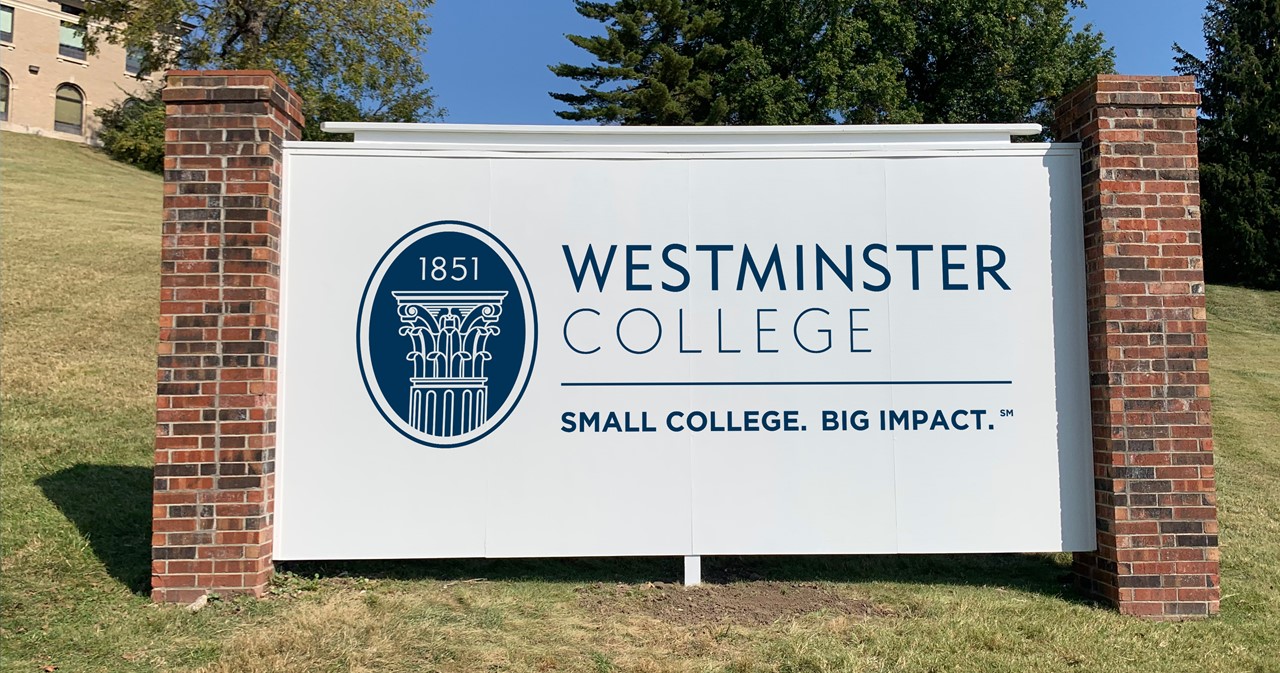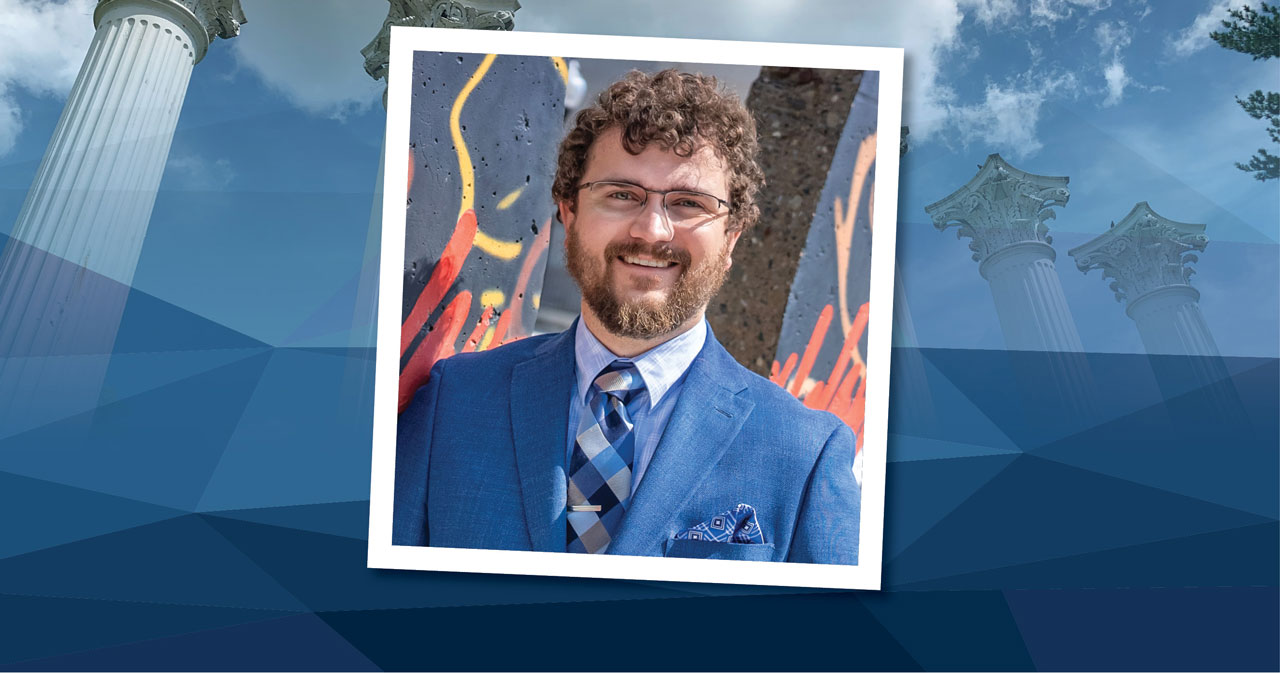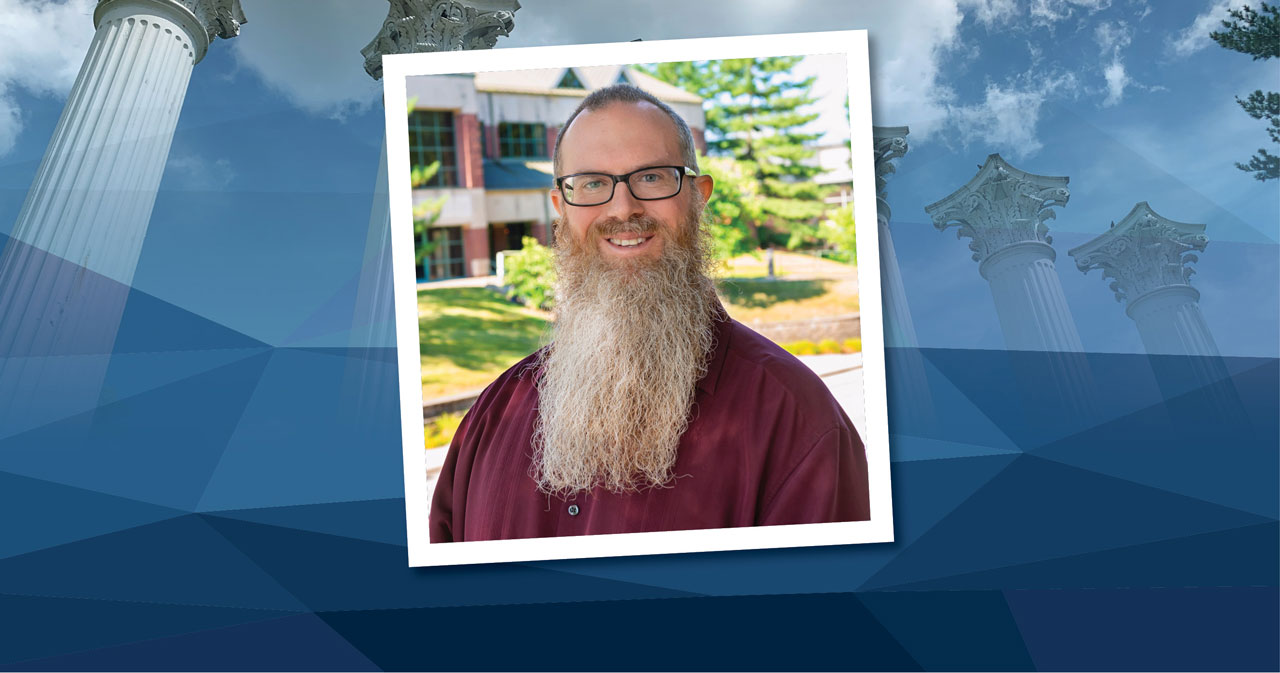3Elements Literary Review recently nominated Dr. Jeremy Reed, Assistant Professor of English, for a prestigious Pushcart Prize in poetry.
While nominations for the well-respected literary award are relatively rare, Reed takes his nomination for “Poem After Campbell McGrath’s ‘Night Travelers’” in stride, emphasizing his commitment to teaching students at Westminster how to write. In fact, the small-town Michigan native says helping students who feel they can’t write is exciting. Read further to learn what else Reed enjoys about Westminster and what he does when he isn’t writing poetry or teaching.
Please tell a little bit about your education.
I received my Ph.D. in English and Creative Writing in 2019 from the University of Tennessee in Knoxville, an M.A. in English from the University of Montana in Missoula in 2014, and a B.A. in English, Spanish, and Humanities in 2012 from Valparaiso University in Valparaiso, IN.
How did you become interested in writing poetry?
I first became interested in writing poetry through reading. By the time I got to high school, I was reading as much as I could from the public library, mostly novels by writers my teachers recommended. At some point, I read some of the Beat writers and ran across the story of Allen Ginsberg reading “Howl” for the first time and the court case about that poem, so I looked it up online and printed the whole thing. I kept that copy of “Howl” — replacing the staple over and over to keep the pages together ― through the rest of high school, reading it over and over, not understanding all of it but knowing that the rhythms and the images were important somehow and were saying something. Reading Ginsberg sent me to Whitman who sent me to Dickinson and on and on. At some point, I realized whether I made it into a career or not that I was a writer.
How did that interest evolve into teaching at the college level?
I knew I wanted to be a teacher even before I wanted to be a writer. Teachers were the first people outside of my family who saw me for who I was and who I could be, and I wanted to be that for other people starting all the way back in elementary school. I didn’t know any English professors growing up though, so I figured I’d teach public school, and I entered college as a secondary education major. Once I arrived and saw what professors do (and that they existed!), I knew it was a better fit for me, and I switched my major to English. I still didn’t know if it would work out at that point, but that’s when I decided I wanted to teach at the college level.
How much time do you devote to writing?
In one sense, I’m always writing. I use my Notes app on my phone or the margins on pieces of paper all the time to jot down ideas, and I’m constantly reading new books, new poems, listening to authors, as well as just talking to friends and learning new things, all of which I think is part of the writing process. In another sense, I try to make time to be present with myself when I feel I need it. For me, that often looks like time in between classes in my office when my brain feels a little overloaded or brimming over with things to do. When I feel that way, I stop multitasking, turn my phone down on the desk, shut the door, and pull out a legal pad to just be quiet and see if a poem starts. I like to use legal pads in part because I can just throw the page away if it doesn’t work out or I need to start over, and immediately there will be another blank page ready to go.
Do many students tell you they hate writing? Have you had many writing “converts”?
Oh, of course! Most often I have students say they’re “not good” at writing. When I hear that, I’m empathetic. We all have times when we feel like we’re not good at writing. But I also get excited. Most of the time, we’re trained to think of writing as a way to argue a point clearly, fully, and understandably, and I agree that knowing what you’re trying to say can be important eventually, but I try to teach my students that being a good writer is also being able to let your thoughts change or being able to discover something you didn’t know you thought or felt before you wrote it. Most often I find the students who don’t think they’re “good writers” actually just have thoughts they’re not sure how to communicate. If you get them talking, they have so many ideas! For me as a teacher, one of the best feelings is hearing a student talk about something important to them, and I’ll say, “Write that!” They often look at me in disbelief, saying, “Wait, I can do that?” Whenever I hear that, I can’t wait to read what they bring back the next time, because I know something’s more open for them. Whether this particular poem, story, or essay works out or not, they think differently about writing than they did before.
How do you encourage your students to approach writing poetry or other types of writing?
Almost every writer I know was a reader first, so I always tell my students to read and read and read. Reading is where we get ideas, where we learn what a poem can do, and where we start to hear our own voice in comparison with others. So, in all of my writing classes, we read widely. When it gets to the writing itself, I try to show students that writing is a process. You start a poem with an image or a turn of phrase or a character and you follow out where it goes, but we don’t often know where it’s going to end up. Whether in a first draft or a revision, that moment when you say something you weren’t expecting, that’s where you can really learn about yourself as a person and a writer. Most of the writing process is revising toward what readers see as the final version, and we spend a lot of time in my classes on revision, but writers have to find out what we need to say before we can say it clearly. The moment of surprise is where that realization of what we’re really saying or thinking often starts.
What is your favorite aspect of teaching at Westminster College?
One of my favorite aspects of teaching at Westminster is the close-knit community on campus. I’ve been able to work with the same students repeatedly across multiple classes, and getting to watch students develop as people and as writers over their time here is really fulfilling.
Can you tell a little bit about your family?
My wife, Ellen, is also a writer and editor who lives with me in Columbia with our puppy, Max.
What are your hobbies/interests when you aren’t writing?
When I’m not writing or reading, I’m catching up on the news, talking to my friends on the phone, and taking my dog on long walks on the trails around Columbia. In non-pandemic times, I’d often go to movies at Ragtag and to concerts in Columbia, St. Louis, and beyond. I’m still new to the area, but so far I’ve really enjoyed the True/False, Unbound Book, and Roots and Blues festivals.
What is one thing nobody at Westminster knows about you?
After I graduated from college, I hiked over 500 miles in France and Spain with a few friends after working with them to save and raise the money to go. The key to a good trip: open communication and breaking in your shoes.
Sarah Rummel Backer is the Director of Media Relations and Senior Writer at Westminster College in Fulton, Missouri. A proud Westminster graduate, Sarah has more than 20 years of experience in marketing and strategic communications in the areas of higher education, medicine, agriculture, and the private business sector.






